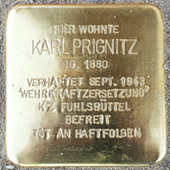Search for Names, Places and Biographies
Already layed Stumbling Stones
Suche

Karl (Carl) Prignitz * 1880
Harburger Schloßstraße 2 (Harburg, Harburg)
HIER WOHNTE
KARL PRIGNITZ
JG. 1880
VERHAFTET SEPT. 1943
"WEHRKRAFTZERSETZUNG"
KZ FUHLSBÜTTEL
BEFREIT
TOT AN DEN HAFTFOLGEN
Karl (Carl) Heinrich Hans Prignitz, born on 11 May 1880 in Ahrensburg, arrested, died on 19 Sept. 1945 due to the consequences of his imprisonment
Harburger Schlossstrasse 2 (Harburg District, Harburg quarter; formerly: Schlossstrasse 24)
Carl Prignitz was born on 11 May 1880 in Ahrensburg. After graduating from school, he completed a three-year apprenticeship in the grain trade. He then spent two years doing his military service with the guard riflemen in Potsdam and then worked again at the company in which he was trained, where he remained employed for almost 24 years, eventually as an authorized signatory.
Carl Prignitz was married to Elsa Prignitz, née Behrens; son Edgar was born in 1907. From 1899 until its dissolution, Carl Prignitz belonged to the national liberal German People’s Party (Deutsche Volkspartei), the Harburg municipal security force (Stadtwacht) and the German Hunting Association (Deutsche Jägerschaft). From 1916 to 1918, he served as a soldier in World War 1.
In 1919, he moved to Harburg and founded "Karl Prignitz, Agentur, Getreide, Mehl, Futtermittel, Landesprodukte,” an agency dealing in grain, flour, animal feed, and produce. In 1920, he received the wholesale permit for the territory of the German Reich from the magistrate of the city of Harburg; the seat of the company was temporarily located at Wilstorfer Strasse 34.
The company existed until 1939, when it was forced to close due to the war. From Feb. 1940, Carl Prignitz worked as an employee in the district administration of the Harburg District (department of family maintenance).
In Sept. 1943, Carl Prignitz was arrested, his employment terminated, and he spent five months in custody. The indictment in the trial before the Hanseatic Special Court (Hanseatisches Sondergericht) in Jan. 1944 charged that he had expressed himself "several times in a manner that was detrimental to the state” and that he "did not always show the German greeting, ‘Heil Hitler,’ as is the self-evident duty for a public official.” In the presence of another witness, he had allegedly said, "I no longer believe in a victorious end to the war for us.”
On 24 Jan. 1944, the court sentenced him to seven months in prison for violating Sec. 2 (1) of the "Treachery Act” (Heimtückegesetz), taking into account the police custody and pre-trial detention he had suffered.
On 3 Apr. 1944, Carl Prignitz was released from detention in the Fuhlsbüttel prison – with severe health problems. He died of lung disease on 19 Sept. 1945.
Translator: Erwin Fink
Kindly supported by the Hermann Reemtsma Stiftung, Hamburg.
Stand: June 2020
© Margrit und Helmut Rüth
Quellen: StaH 351-11_4581; StaH 213-11_1226/44; Matthias Heyl und Margit Maronde-Heyl: Harburger Opfer des Nationalsozialismus; Adressbuch Harburg-Wilhelmsburg 1932; Adressbuch der Stadt Harburg 1922/1923; Hamburger Adressbuch 1942.

